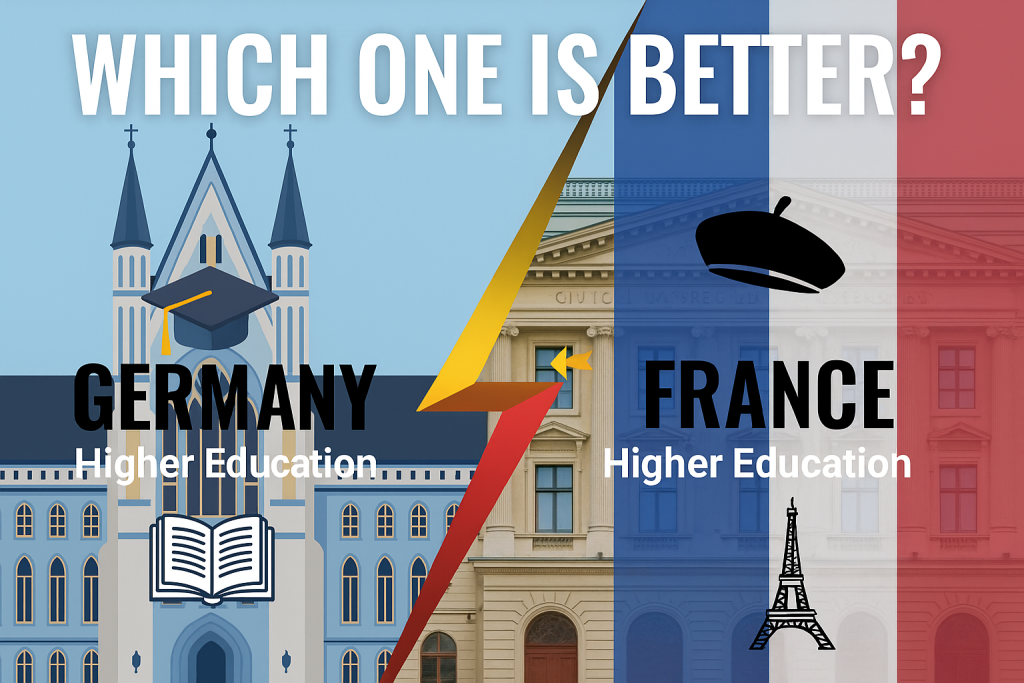Last Updated on October 31, 2025
Germany vs. France: Which is Better for Higher Education Abroad?
Choosing the right country for higher education abroad is one of the most crucial decisions for international students. Among the top choices in Europe, Germany and France stand out as popular destinations. Both countries offer world-class universities, affordable education options, diverse cultures, and promising career prospects. But the big question remains: Germany vs. France – which is better for higher education abroad?
This blog will compare higher education in Germany vs. France based on tuition fees, scholarships, visa requirements, top courses, student life, and job opportunities so you can make an informed choice.
1. Tuition Fees and Cost of Living
Germany
- Public universities in Germany mostly offer tuition-free education, except for a small semester fee (around €250–€500).
- Living costs average €900–€1,200 per month, depending on the city (Munich being more expensive, Leipzig more affordable).
- Affordable compared to other European countries, making Germany highly attractive for international students.
France
- In France, tuition fees are relatively affordable compared to the UK or USA, especially in public universities.
- EU/EEA students pay lower tuition, while non-EU students pay around €2,770/year for bachelor’s and €3,770/year for master’s programs.
- Cost of living in France ranges between €1,000–€1,400 per month, with Paris being significantly more expensive than smaller student cities like Lyon or Toulouse.
Verdict: Germany is more budget-friendly due to tuition-free education, while France is slightly costlier but still affordable compared to English-speaking countries.
2. Quality of Education and Top Universities
Germany
- Renowned for engineering, STEM, and technical programs.
- Popular universities: Technical University of Munich (TUM), Heidelberg University, RWTH Aachen University, Humboldt University of Berlin.
- Strong industry collaboration, especially in automotive, IT, and research sectors.
France
- Famous for arts, fashion, business, hospitality, and social sciences.
- Popular universities: Sorbonne University, University of Paris-Saclay, HEC Paris, INSEAD, Sciences Po.
- Globally respected for MBA programs, hospitality management in France, and fine arts.
Verdict: Germany excels in engineering and technology, while France leads in arts, fashion, and business education.
3. Language of Instruction
Germany
Many bachelor’s programs are in German, but English-taught master’s degrees are widely available. Learning German is highly recommended for better job opportunities.
France
Increasing number of English-taught courses, especially in business and hospitality. However, French language proficiency helps students integrate and access more career opportunities.
Verdict: Both countries are expanding English programs, but learning the local language is a plus for international students.
4. Visa Requirements
Germany Visa Requirement
- International students need a German Student Visa (National Visa – D type).
- Must show proof of blocked account (~€11,208/year) for living expenses.
- Students can work 120 full or 240 half days per year on a student visa.
France Visa Requirement
- Students require a France Student Visa (long-stay visa – VLS-TS).
- Proof of financial resources of about €615/month.
- Students can work up to 964 hours per year (20 hours/week).
Verdict: Visa requirements in Germany and France are straightforward, but Germany requires a higher financial guarantee.
5. Scholarships
Scholarships in Germany
- DAAD Scholarships (most popular).
- Erasmus+ Program.
- University-specific grants.
France Visa Requirement
- Eiffel Excellence Scholarship.
- Campus France scholarships.
- Erasmus+ Program.
Verdict: Both countries offer generous scholarships, but Germany is more research-focused, while France supports business and cultural studies.
6. Job Opportunities After Graduation
Germany
- International graduates get an 18-month job-seeking visa after studies.
- High demand in engineering, IT, healthcare, and research.
- Pathway to EU Blue Card and permanent residency.
France
- Graduates can apply for a 12-month residence permit to find a job.
- Strong opportunities in luxury brands, hospitality, tourism, arts, and business management.
- Also offers pathways to permanent residency.
Verdict: Germany provides better opportunities in STEM and long-term settlement, while France is ideal for careers in business, hospitality, and creative fields.
7. Student Life and Culture
Germany
Known for its multicultural student community, modern cities, and efficient public transport. Students enjoy Oktoberfest, Christmas markets, and vibrant nightlife.
France
Offers a rich cultural experience with art, history, cuisine, and world-famous landmarks. Paris is a global hub, while cities like Lyon, Bordeaux, and Toulouse offer a balance of affordability and culture.
Final Verdict: Germany vs. France – Which Should You Choose?
- Choose Germany if you want: tuition-free education, STEM and research-focused programs, and long-term career opportunities in technology and engineering.
- Choose France if you prefer: affordable tuition with global exposure in fashion, hospitality, arts, and business, along with a culturally rich lifestyle.
Both Germany and France are excellent choices for higher education abroad—your decision should depend on your academic interests, career goals, and budget.
For expert counseling and end-to-end guidance on studying abroad, connect with GeoEdutech, your trusted overseas education partner.
For more see: Study in Germany
FAQ
Is Germany or France better for higher education abroad?
It depends on your career goals—Germany is better for engineering, technology, and research, while France is ideal for arts, fashion, hospitality, and business.
Are universities in Germany tuition-free for international students?
Yes, most public universities in Germany offer tuition-free education, with only a small semester contribution.
What are the visa requirements for studying in Germany and France?
- Germany: German Student Visa with proof of blocked account (~€11,208/year).
- France: France Student Visa (VLS-TS) with proof of €615/month financial resources.
Which country is cheaper for international students, Germany or France?
Germany is generally more affordable due to free tuition. France is costlier but still cheaper compared to the USA, UK, or Australia.
Can I work while studying in Germany or France?
Yes, in Germany students can work 120 full or 240 half days per year. In France, students can work 20 hours per week.
Which country offers better job opportunities after graduation?
Germany offers excellent opportunities in STEM and engineering fields, supported by an 18-month job-seeker visa for graduates. On the other hand, France provides strong prospects in hospitality, luxury, arts, and business, making it an ideal destination for students pursuing a hospitality internship in France. This pathway not only enhances professional exposure but also opens doors to rewarding career opportunities in France’s world-renowned hospitality and tourism sector.






